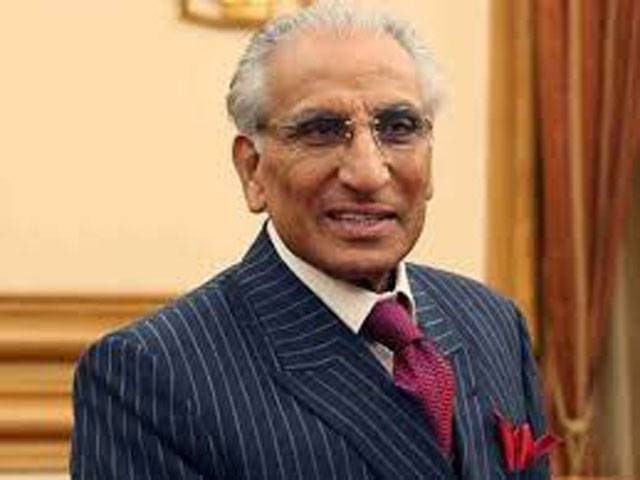ISLAMABAD - Pakistan said yesterday that the rise of the United States as a sole superpower resulted in disappointment and hopelessness.
Special Assistant to the Prime Minister on Foreign Affairs Tariq Fatemi said that Washington as a superpower did not yield positive results.
He said that Russia was an important global power and Pakistan was enhancing defence and trade ties with Moscow.
“The (last) meeting between Prime Minister Nawaz Sharif and President Vladimir Putin was very warm and positive,” he recalled. Fatemi said that the Russian frontiers in the Eastern Europe were being hemmed in.
The comments came as Pakistan is going through a phase of tense diplomatic ties with the US. The differences that deteriorated with Washington’s refusal to provide F-16 jets to Pakistan at subsidised rates ended up seeing the US tilting towards India.
Washington openly supported India in its failed bid to become a member of the Nuclear Supplier Group and vowed to enhance defence and trade ties with New Delhi, he said.
Addressing a seminar on Pakistan’s international relations here, Tariq Fatemi said that Pakistan cannot remain oblivious of developments in the world and the region.
He said that US President Barack Obama and Secretary of State John Kerry lobbied for India to get a seat in the NSG but Pakistan had demanded fair treatment.
“No country’s foreign policy is a complete success or a failure,” he said defending the govt’s policy in the recent months.
Claiming India’s failed bid for NSG membership a success for the foreign policy, he said: “We convinced an international body that instead of discrimination, fair treatment should be ensured in both Pakistan and India’s cases. Nobody should be preferred.”
He said that the role of the Foreign Ministry was to gather information and discuss the issues with the stakeholders.
“Instead of being disappointed, we should try hard to get better results,” he said.
Fatemi said that peace cannot be achieved without the sincerity of the two sides.
“With only one party wanting peace, we cannot get it. We need joint efforts,” he said referring to peace in Afghanistan.
He said that Afghan refugees will be repatriated with dignity and honour.
He said that Pakistan was hosting over 3 million Afghan refugees for the last over 35 years, adding, but now it has been decided that they will have to go to their home country.
“Pakistan urges the international community to help create enabling environment in Afghanistan,” he said.
He said personally he was opposed to the killing of Afghan Taliban leader Mullah Akhtar Mansour when several nations were making efforts for peace.
Fatemi said check-posts on Pak-Afghan border were part of the border management. He maintained some forces did not want cordial relations between Pakistan and Afghanistan.
He further said that Pakistan was determined to construct gates at all the major exit and crossing points along the border with Afghanistan to check illegal cross-border movement.
He said that effective border management with Afghanistan was also essential to achieve the positive results of the two years of successful counter-terrorism campaign carried out in the form of the operation Zarb-e-Azb.
Terming the reaction of Afghanistan on this issue as “unfortunate”, he said, that the matter of border management was discussed with Afghanistan at the highest levels.
Tariq Fatemi was confident that Afghanistan will never allow its soil to be used against Pakistan.
He said that Gwadar and Chabahar ports are not rivals ports.
Fatemi said that Pakistan was determined to enhance ties with Iran. Fatemi said that Pakistan was committed to gas pipeline project with Iran.
He said that a Chinese company had been given the contract to spread gas pipeline from Gwadar to Faisalabad, adding, another 75-kilometre pipeline needed to be laid to connect Pakistan-Iran lines.
He said that Pakistan desired friendly ties with India to resolve all the issues through dialogue.
“We want result-oriented talks with India to resolve all the issues. We want peace with all neighbours,” he added.
He said that in 1974, Pakistan, India and Bangladesh had signed an agreement that they will forget the past and work for the future.
Fatemi said Pakistan attached great importance to Shanghai Cooperation Organisation and fully endorsed its aims, objectives and principles enshrined in its Charter.
He said as a full member Pakistan believed that SCO, its orientation and its direction were in consonance with his country’s objectives of promoting peace, stability and development.
Fatemi said that Pakistan and China were working in close coordination on the issues related to counter-terrorism and security in the interest of regional and global peace and stability.
He said that friendship with China was the cornerstone of Pakistan’s foreign policy.
He said that Pakistan and China enjoy complete unanimity of views and excellent cooperation in counter-terrorism and security matters.
Fatemi said that Pakistan had sacrificed in the war on terror more than any other country.
“We do not discriminate between good or bad Taliban. We are committed to eliminate terrorism,” he contended.
He further said that Pakistan had good ties with the Arab world and several agreements were being signed with them on a regular basis.
Institute for Policy Reforms head Humayun Akhtar Khan also addressed the seminar.
He said that Pakistan needed to improve ties with the US and move on.
He said that tension with India was also not a good sign for the region, adding, peace in Afghanistan was in favour of Pakistan.






